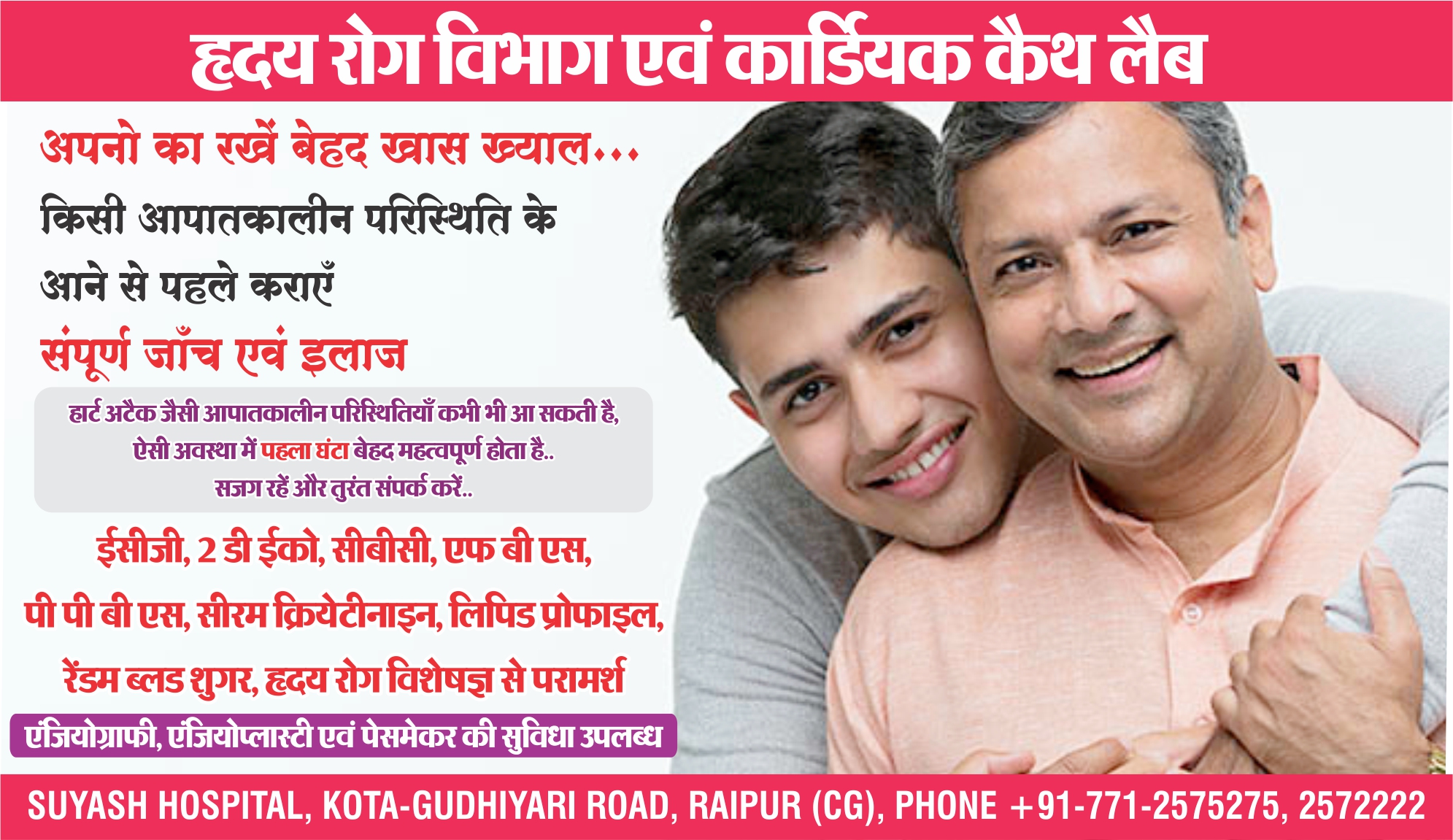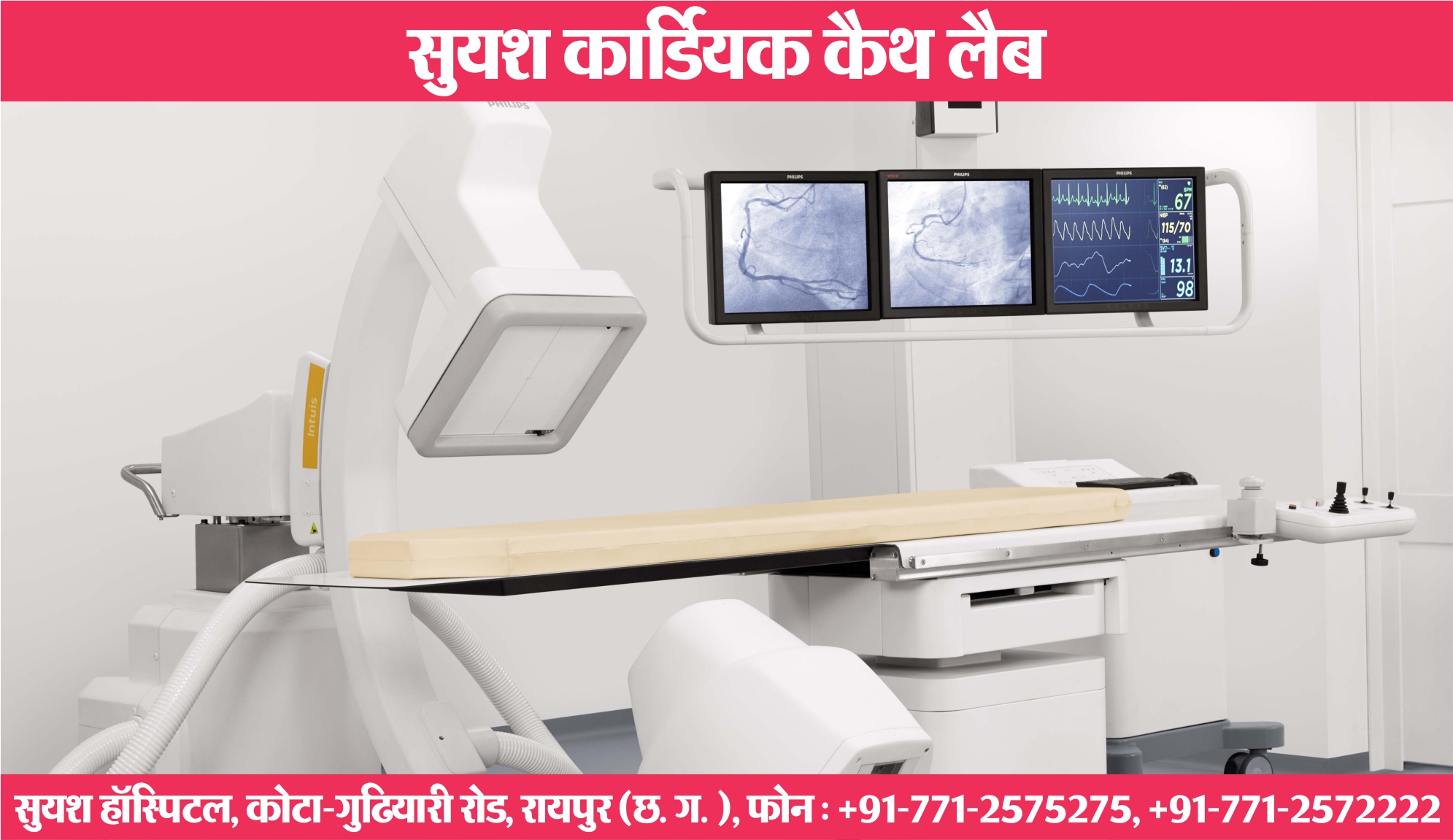The department of Cardiology & Cardiac Cathlab at Suyash Hospital, a renowned and top cardiologist with extensive experience in the aspects of cardiac care ranging from echocardiography, angioplasty, angiography, open heart surgery, and a pacemaker to the advanced treatments for heart failure, cardiac rehabilitation, and preventive cardiology. Patients from the various region of central India with heart or cardiovascular diseases come for treatment. The department is committed to focusing on the accurate diagnosis and treatment of multiple complex diseases.

The cardiac team has expertise in the field of rheumatic heart diseases including coronary artery disease, juvenile mitral stenosis, heart failure, congenital heart defects, valvular heart disease, angioplasties, cardiomyopathies, and arrhythmias. The team efficiently performs all the open surgeries. All the procedures including heart catheterizations, angioplasty, or inserting a pacemaker are performed with great proficiency by the team. Our renowned team of heart specialists has attained reverence in various subspecialties such as invasive, non-invasive, interventional, and therapeutic cardiology.
The department of Cardiology & Cardiac Cathlab collaborates actively with other departments to perform superlative therapeutic and diagnostic procedures such as Carotid artery ultrasound, Biventricular pacing/cardiac resynchronization therapy, Electrophysiology testing to accurately assess multiple cardiac disorders and supported by the state-of-the-art infrastructure and the most advanced equipment, thereby ensuring sophisticated care to the patients. The team continuously focuses on providing innovative treatments in enhancing the quality of life of the cardiac patients
The Cardiology department at Suyash Hospital deals with the management of various disorders related to the heart and blood vessels. Our aim is at early medical diagnosis and treatment of coronary artery disease, heart failure, congenital heart defects, vascular heart disease, and electrophysiology.
Suyash Hospital has a dedicated and renowned team, who are supported by cutting-edge technology and state-of-the-art infrastructure to provide superior quality care to all the patients. The team of the best cardiologists performs various procedures such as heart catheterizations, angioplasty, or insertion a pacemaker. The three main types of cardiology procedures performed include Invasive, Non-invasive, and Interventional cardiology. The procedures performed by our best heart specialists in the are usually non-surgical using a catheter – a small, flexible tube – to repair damaged or weakened vessels, narrowed arteries, or other affected parts of the heart structure. Common conditions treated by our team include:
» Coronary artery disease
» Heart valve disease
» Peripheral vascular disease
The department of Cardiology, who aim at providing superior and compassionate care to patients in order to ensure better treatment outcomes and speedy recovery of the patients. There are three main types of cardiology procedures: Invasive, Non-invasive, and Interventional.

Common types of invasive cardiology include:
» Angioplasty: When plaque clogs the arteries, it becomes difficult for blood to flow normally. Angioplasty inserts a tiny balloon into the clogged vein and pushes the plaque against the walls, allowing for increased blood flow.
» Stenting: Stenting is usually done in conjunction with angioplasty. A cardiac stent is a small metal coil that permanently holds a clogged vein open.
Non-invasive cardiology identifies heart problems without using any needles, fluids, or other instruments inserted into the body. Non-invasive cardiologists utilize techniques such as:
» Echocardiography: The usage of ultrasound waves to create images of the heart and surrounding structures in order to identify how well the heart pumps blood, infections, and structural abnormalities.
» Cardiac electrophysiology: Study and testing of the electrical currents which generate heartbeats.
» Stress tests: Stress testing usually involves exercise which is closely monitored by the cardiologist. These exercises provide information about how a person’s heart performs under physical stress.
» Heart monitors: Heart monitors may also be called cardiac event recorders. Heart monitors are essentially tape recorders for your heart’s electrical activity over a set amount of time.
» CT scans: CT scans produce images of the affected area examined by the cardiologist for any heart diseases and atherosclerosis.
Interventional cardiology is a non-surgical technique that uses a catheter – a small, flexible tube – to repair damaged or weakened vessels, narrowed arteries, or other affected parts of the heart structure. Common conditions treated by interventional cardiology include:
» Coronary artery disease: Narrowing of the arteries which supply the heart muscle with blood and oxygen.
» Heart valve disease: Occurs when the valves which control blood flow into the heart’s chambers are not working correctly.
» Peripheral vascular disease: Your heart can also be affected by clogged or hardened veins and arteries in the other parts of your body.
